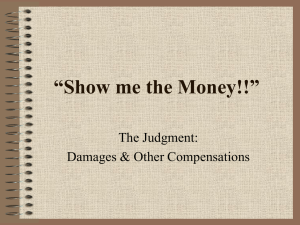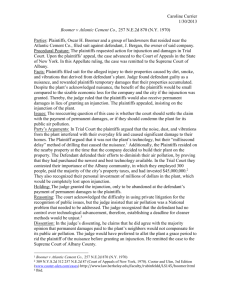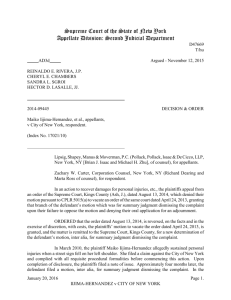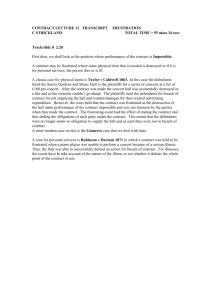Wasukira Fredrick & 2 ors v Harmony Group Ltd
advertisement
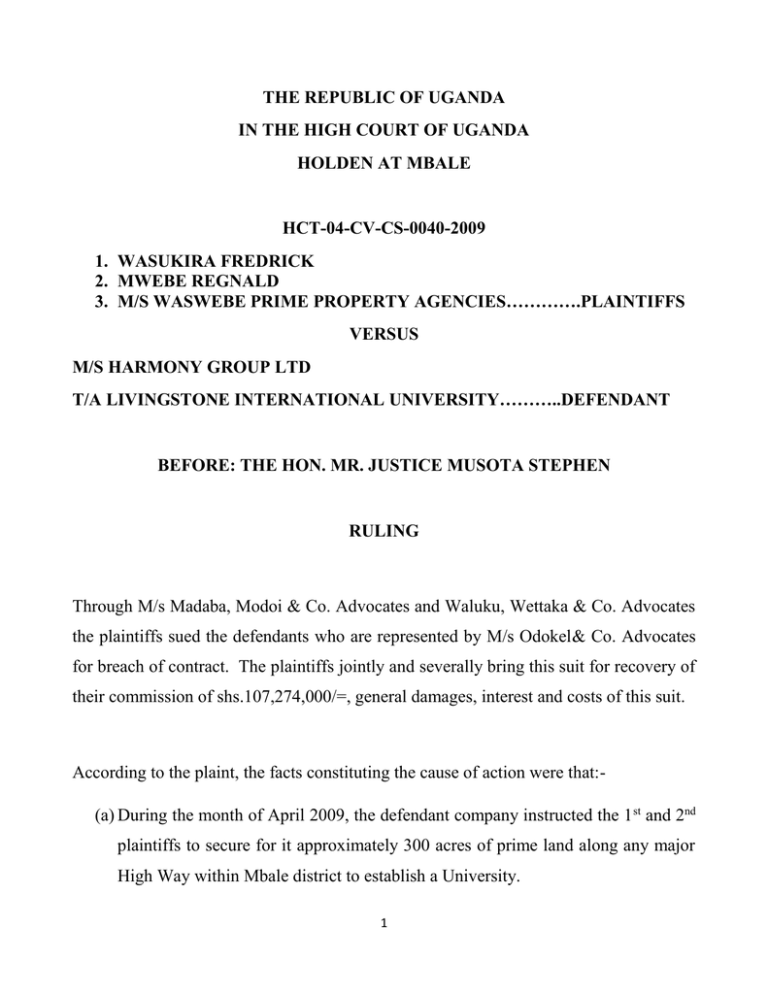
THE REPUBLIC OF UGANDA IN THE HIGH COURT OF UGANDA HOLDEN AT MBALE HCT-04-CV-CS-0040-2009 1. WASUKIRA FREDRICK 2. MWEBE REGNALD 3. M/S WASWEBE PRIME PROPERTY AGENCIES………….PLAINTIFFS VERSUS M/S HARMONY GROUP LTD T/A LIVINGSTONE INTERNATIONAL UNIVERSITY………..DEFENDANT BEFORE: THE HON. MR. JUSTICE MUSOTA STEPHEN RULING Through M/s Madaba, Modoi & Co. Advocates and Waluku, Wettaka & Co. Advocates the plaintiffs sued the defendants who are represented by M/s Odokel& Co. Advocates for breach of contract. The plaintiffs jointly and severally bring this suit for recovery of their commission of shs.107,274,000/=, general damages, interest and costs of this suit. According to the plaint, the facts constituting the cause of action were that:(a) During the month of April 2009, the defendant company instructed the 1 st and 2nd plaintiffs to secure for it approximately 300 acres of prime land along any major High Way within Mbale district to establish a University. 1 (b) That the mutually agreed upon consideration was a reward of 20% of the total purchase price and compensation as commission by the defendant to the 1 st and 2nd plaintiffs upon fulfillment of the terms of the contract to be executed at a later date. (c) The plaintiffs identified to the defendants a parcel of land measuring 300 acres of prime land at Nasenyi village, Kamonkoli Sub-county, Budaka District. (d) That the defendants instructed the 1st and 2nd plaintiffs to negotiate prices with various land owners and stakeholders for the purchase and compensation of 70 acres of land and to obtain consent from the relevant local authorities and cause inspection of the said land by the defendant prior to purchase. A survey was done (Annex B) and the defendants ended up buying 56 Acres at a cost of 7,000,000/= per acre. Compensation was to be made for any developments on the land. (Annex C). Later in time, on 3rd August 2009 the 1st and 2nd plaintiffs incorporated the 3rd plaintiff company for purposes of executing the contract with the defendant in respect of the transaction that had been performed by the parties (Annex E). The contract was executed on 21st August 2009 to “formalize the relationship with the defendant (Annex F)”. Thereafter, on 1st September 2009 the plaintiffs demanded for the payment of the 20% commission amounting to 107,274,000/= (Annex G). The plaintiffs further contend that on 11th September 2009, the defendants wrote to the plaintiffs purporting to rescind the contract and pay directly the land owners (Annex H & I). The plaintiffs contend that the defendants had no lawful excuse to rescind the contract. 2 In their defence, the defendant denies the claim by the plaintiffs. It avers that it had no binding contract with the plaintiffs and aver that the 1 st and 2nd plaintiffs are mere agents of the 3rd plaintiff and not parties to the rescinded contract with the 3 rd plaintiff. The defence further avers that the plaintiffs failed to perform the assignment, and deny contracting the plaintiffs to secure for it 300 acres of land. That the defendant fully participated in securing the land. The defendant says it did not have a binding contract with the land sellers to enforce a deduction of 10% from them and accuse them of fraud. Finally the defence avers that the 3rd defendant has no cause of action against them as at the time of the contract and there for the instant suit is premature, incompetent, barred by law, misconceived and should be dismissed with costs. Before scheduling this suit for hearing Mr. Odokel Opolot learned counsel for the defendant raised a preliminary objection to the suit that:(1) The suit does not disclose a cause of action because the cause of action is based on a commission or agency agreement which offends S.2 of the Stamps Act. (2) At the time when the purported cause of action arose the 3 rd plaintiff was not incorporated therefore the 1st and 2nd plaintiffs were contracted by a non exiting principle. (3) The 1st and 2nd plaintiffs did not do anything for a principle who was non-existent. In response to these objections Mr. Waluku for the plaintiff submitted that: (1) The law does not cover the situation under consideration. He referred to S.2 of the Stamps Act. (2) Regarding the pre-incorporation contract, the contract was between the 3 rd plaintiff and the defendant. 3 That the preliminary objections be overruled. As rightly submitted by Mr. Odokel Opolot for the respondent where a cause of action is based on a document where stamp duty must be paid and the duty is not paid a cause of action cannot in law be based on such document. It is settled law that the question as to whether a plaint discloses a cause of action must be determined upon perusal of the plaint together with any attachments which form part of the plaint and upon the assumption that any express or implied allegations of fact in it are true: LERAJ SHARIFF & CO. CHOTAI FANCY STORES 1960 EA.374, 375. In the instant application, the plaint is supported by annexture ‘F’ an agreement for commission payments/remittances made on 21 st August 2009 between M/s Waswebe Prime Property Agencies Ltd P.O. Box 1228 Mbale and the defendants signed by the 1 st and 2nd plaintiffs as Managing Director and company Secretary respectively on which no stamp duty was paid. S.42 of the Stamps Act Cap.342 of the Laws of Uganda enacts that: “No instrument chargeable with duty shall be admitted in evidence for any purpose by any person having by law or consent of the parties authority to receive evidence, or shall be acted upon, registered or authenticated by any such person, or by any public officer, unless the instrument is duty stamped.” PROLINE SOCCER ACADEMY LTD V. LAWRENCE MULINDWA & 4 ORS HCMA 0459/2009 4 Generally under S.38 (as it was) of the Stamps Act, any instrument on which a duty is chargeable is inadmissible in evidence unless that instrument is duty stamped as an instrument on which duty chargeable thereon has been paid. YOKOYADA KAGWA V. MARY KIWANUKA AND ANOR [1979] HCB 23. If the plaintiff wanted to rely on such unstamped instrument, they ought to have sought leave of court to have the duty paid. The plaintiffs however have not sought leave of court to do so. I will therefore uphold the submission by Mr. Opolot learned counsel for the defendants that the plaintiffs cannot rely on the unstamped agreement as evidence in this suit. No court will lend its aid to a plaintiff who founds his claim upon an illegal act. The effect of non-registration of documents is a matter of substantive law, not procedure. A plaintiff must have a legally protected interest. Mr. Waluku for the plaintiffs has not demonstrated existence of a legally protected interest in the suit against the defendants and therefore the plaintiffs lack a cause of action against the defendants. Secondly, from the pleadings at the time the purported cause of action arose, the 3 rd plaintiff, M/S WASWEBE PRIME PROPERTY AGENCIES LTD, was not incorporated yet the 1st and 2nd plaintiffs claim they were contracted on behalf of the 3 rd plaintiff which was non-existent. This means they were working for a non existent principle. The agreement for commission payments/remittances was signed to bind a principal that was not in existence. In their pleadings in paragraph 4(a) and H of the plaint, it is stated that:“4 The facts constituting the cause of action arose as under: 5 (a) During the month of April 2009, the defendant company instructed the 1st and 2nd plaintiffs to secure for it approximately 300 acres of prime land along any major High Way within Mbale District to establish a University. (h) On August 3rd 2009, the 1st and 2nd plaintiffs duly incorporated the 3rd plaintiff company for the purpose of executing the contract with the defendant in respect of the transactions that had been performed by the parties. Copy of the Certificate of incorporation attached hereto as annexture ‘E’.” Clearly, the 3rd plaintiff was incorporated long after the 1st and 2nd plaintiffs had dealt with the defendant and made the purported agreements to look for land for the defendant. The law is settled that a contract or an agreement made before a company is formed cannot bind the company formed afterwards. Nor can a company by adoption or ratification obtain the benefit of a contract or agreement purporting to have been made on its behalf before it came into existence. In order to do so a new contract must be made with it after its incorporation on the terms of the old one. See: THE MICRO FINANCE SUPPORT CENTRE LTD VS. THE UGANDA MICRO ENTERPRENUERS & 2 ORS HCCS 1007/2004 per Bamwine J (as he was) NEC & 2 ORS V. NILE BANK LTD SCCA NO.17/97 (1995) 1 KALR 138 AT 144. Annexture ‘F’ to the plaint is not such new contract envisioned in the above case. All along the 1st and 2nd plaintiffs held out to be directors of the 3rd plaintiff and purported to act on its behalf even before it was incorporated. They could not purport to ratify actions done before a principal came into existence. One can only ratify decisions of an existing principal. 6 I am of the considered view that the plaintiffs’ pleadings do not disclose a cause of action. Under O.7 r.1 (a) of the Civil Procedure Rules, a pleading which does not disclose a cause of action must be rejected. Accordingly, I will uphold the preliminary objection by Mr. Odokel Opolot and order that this plaint/suit is struck out on account of non-disclosure of a cause of action with costs. Musota Stephen JUDGE 15.03.2011 15.3.2011 Jude Wamimbi for the plaintiffs who are in court. Defendant representative Phillip Shero Illukol Emmanuel on brief for Deo Odokel. Kimono Interpreter. Wamimbi: The matter is for Ruling. Court: Ruling delivered. Musota Stephen JUDGE 15.03.2011 7
